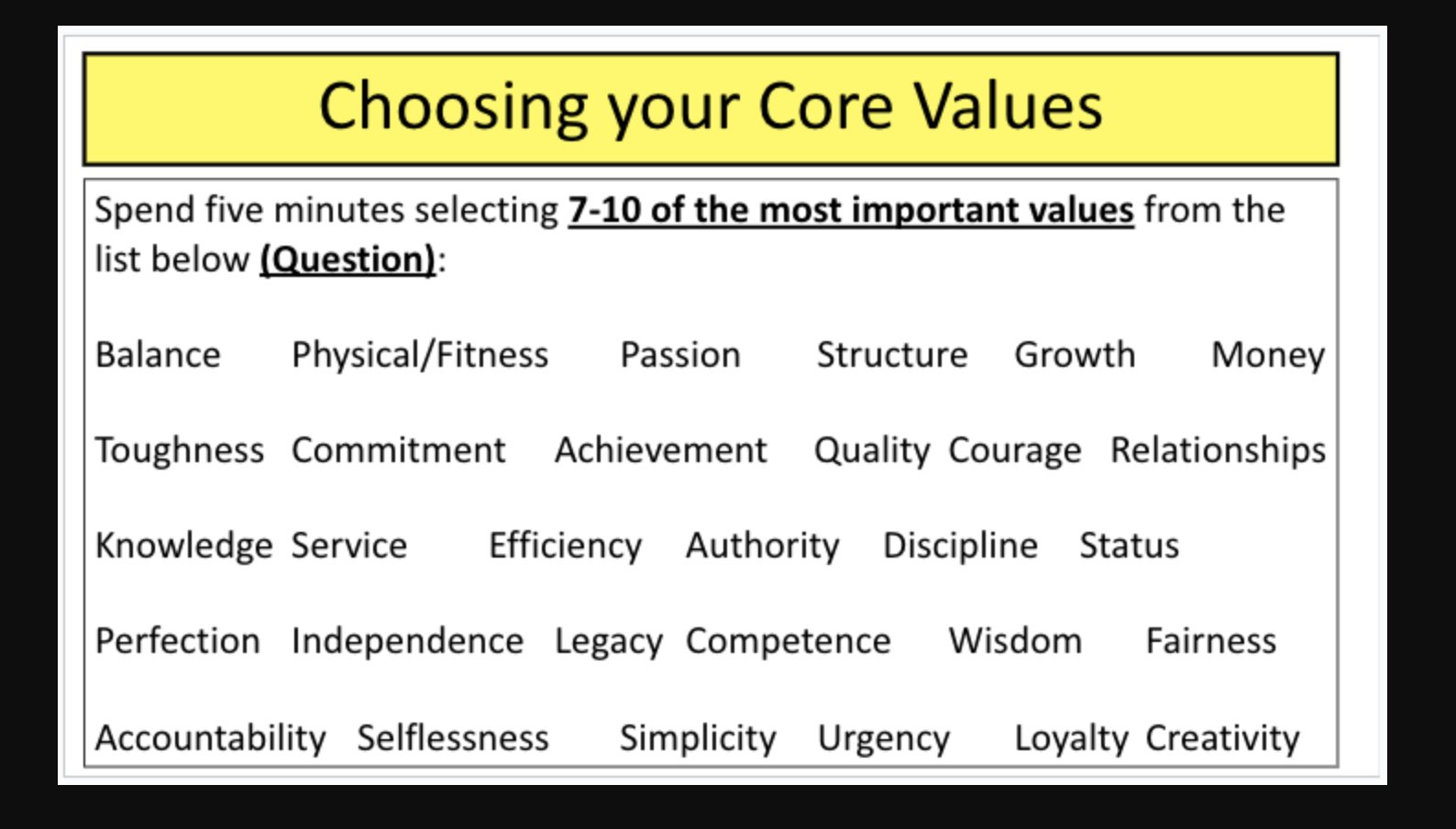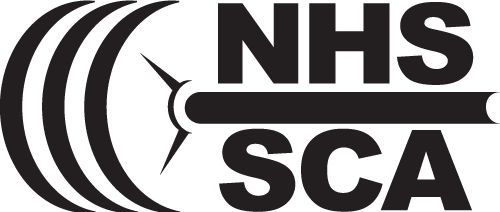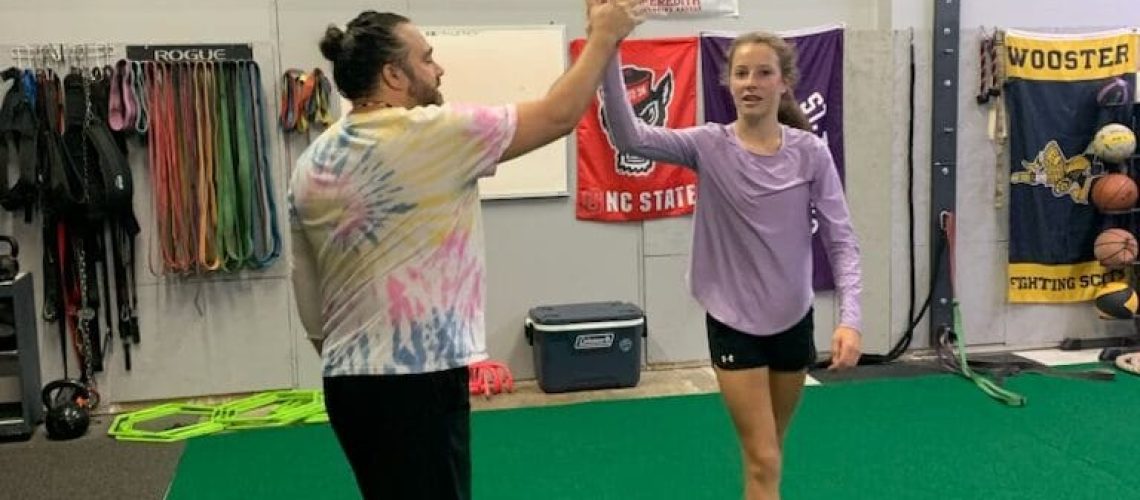By Justin Dottavio, M. HRM
Malcolm X famously said, “A man [person] who stands for nothing will fall for anything.” As strength and conditioning coaches we are tasked with not just the physical coactive of athlete development, but also the psychological coactive of our athlete’s sport performance (Connolly 161). The holistic nature of training in today’s athletic world requires us to not only have situational awareness and emotional intelligence regarding “reading” our athletes’ moods and wellness, but also to improve our own self-awareness as a coach and community member along the way.
As a community member, classroom teacher, and strength and conditioning coach, I try to live out my Core Values (CV) – detailed below – in my daily life. Your athletic department or business could benefit from core values training for a variety of reasons: 1. Selecting and defining your business’s CVs as a group gives ownership to all stakeholders involved. 2. Having each athlete and staff member select their own individual CVs gives them time for self-reflection and growth. If Kaizen, or a continuous feedback loop, is important in S&C then it is vital in everyday life.
The founder and CEO of the Cultural Training System Focus 3, Tim Kight, is often quoted as saying, “Most companies don’t have core values, they have poster values.” What he means is that most organizations put up signs on the wall and don’t take the time to establish a true meaning behind those CVs. Catchy signs and slogans on a t-shirt are great, but they have to mean something to you and everyone in your community to see a benefit from them.
Core values training method
When I offer CV training, I use the core values training method as laid out by The Program, LLC in their book, The Program: Lessons From Elite Military Units for Creating and Sustaining High Performance Leaders and Teams. In The Program, there’s a chapter on core values with around 30 potential core value words that I’ve adapted to fit my needs. The Program recommends you take time to pare the 30 words down to about 10 values, and then again pare down 10 to five values, before settling on your two or three official core values (Kapitulik, et al. 8-9).

When selecting your core values, keep in mind that like sets or exercises in the weight room, most people can’t remember more than three things at a time. By having only two or three core values it underlines the importance of each. My CVs are: Relationships, Commitment and Discipline (Habits). I believe those CVs align with my personal purpose statement, which is to believe in others so they can believe in themselves.
Belief, Behavior and Outcome
Focus 3 says that every CV needs a Belief, a Behavior and an Outcome, or the “BBO” of the core value, in order for it to have a true meaning (Kight). We’ve all been called to the principal’s office and seen that poster with a waterfall that says “Accountable,” which they got for free at a random teacher training. That poster is why your CVs need a BBO: to make them real and poignant to your training facility, and not just a word on the wall.

The Belief is a catchy phrase to define the word; the Behavior is what you want to hear or see; and the outcome is the end result. Using “Relationships” as an example:
Belief: “The salvation of man is through love and in love”- Viktor E. Frankl (Frankl 57)
Behavior: Empathy and Understanding or “E+U”
Outcome: Positive, quality relationships in our community.
The core values of your business, athletic department, or program should never change. The BBO can shift slightly, while the goals associated with your CVs should change over time. When you accomplish a goal, it is always ideal to then establish a new goal to continue to see growth and improvement.
Conclusion
Having core values to focus on and standards to uphold those CVs gives us the accountability we need in a performance setting. UCF’s Dr. Lee Ross once told me, “The hardest part of your day is putting your feet on the floor in the morning.” Once you’re out of bed, it’s your job to harness your energy and focus your attention on fulfilling your purpose and living up to the standards of your core values each and every day.

I have not only established my own core values, but I have also led the teaching of staff professional development and student-athlete core values training. Having facilitated CVs training over the course of five years, I truly do believe in the power of outlining core values. They are a fantastic guide on the journey to holistic wellness and continuous development.
Sources
Connolly, Fergus. (2017). Game Changer: The Art of Sports Science. Victory Belt Publishing.
Frankl, Viktor E. (1984). Man’s Search For Meaning: An Introduction to Logotherapy. Washington Square Press.
Kapitulik, Eric and MacDonald, Jake. (2019). The Program: Lessons From Elite Military Units for Creating and Sustaining High Performing Leaders and Teams. Wiley.
Kight, Timothy. (2023, March 15th). Culture Blueprint.
https://focus3.com/cultureblueprint/#cultureblueprint
Justin Dottavio, M. HRM, is Assistant Strength and Conditioning Coach, EB Athletics, LLC (Raleigh, NC), and has more than 18 years of experience as a strength & conditioning coach. He is a USAW Level 1, Exos Performance Specialist, Reflexive Performance Reset Level 1, and 200-hour certified yoga teacher. Coach Dottavio can be reached at justin.dottavio@gmail.com.


